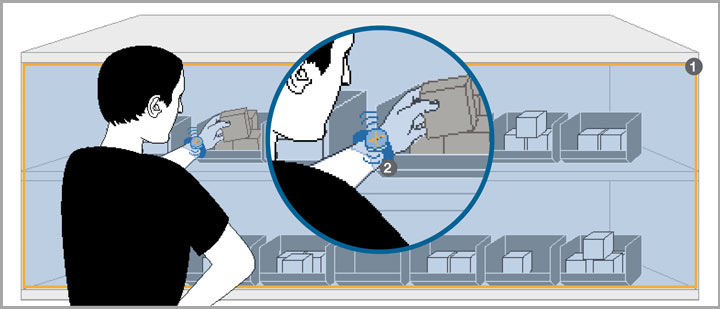In logistics it is important to provide the right product in the right quantity at the right cost in the right quality at the right time in the right place. A central function for achieving this goal is order picking. Due to the flexibility required in most cases, this is still mainly carried out manually. In manual picking, however, high error rates are predominant, which result in a large additional effort for the employees and thus high costs for the company. In order to reduce or avoid this problem, information provision and intervention monitoring systems are used. The former are intended to support the order picker in his work by means of various information displays (e.g. acoustic, optical) and thus reduce the error rate. Intervention monitoring systems, on the other hand, immediately detect errors during picking and inform the employee accordingly. Current systems work with optical sensors, light barriers or laser scanners. However, these are rarely used due to their large installation costs, high acquisition costs and light-dependent reliability. Furthermore, it is usually not possible to differentiate between employees, which is why only a maximum of one employee can be deployed per warehouse section.
The aim of the ValidKomm research project is to develop a novel intervention monitoring and order picking system that is easy to install and modify, can identify order pickers and is also inexpensive to purchase.
For this purpose, the principle of inductive near-field location, which is shown in Figure 2, is to be used. To detect an intervention, an induction loop (1) is placed around the picking rack, which can detect a change in the prevailing magnetic field when a passive coil (2) is inserted. The coil is to be incorporated into an order picking wristband (3) worn by the order picker during the performance of his work. During an intervention, the position of the coil is detected and subjected to a target/actual comparison. If an error is detected, a corresponding message is sent to the picking wristband via radio connection, which informs the picker of the error via a signal (e.g. haptic, acoustic or optical).
In addition, the implementation of additional functions in the picking wristband is to be checked. Among other things, it would be conceivable to display the withdrawal quantity or the remaining order items.
The main result of the research project will be the realization of the ValidKomm order picking system under consideration of both technological and economic goals.
At the start of the project, current information provision and intervention monitoring systems in manual order picking will be analysed and their strengths and weaknesses identified. In the course of this, possible application scenarios for the picking wristband to be developed are also identified. Subsequently, technical, logistical and economic requirements for the new picking system are recorded and recorded in a catalogue of requirements, supported by expert surveys and specifications from standards.
In the second phase of the project, logistics concepts will be defined on the basis of the identified application scenarios, from which a promising concept will be selected for further work. For this, technical components will be selected or combined and the inductive near-field location will be coordinated for the new application. After the programming of the software components, first system tests are carried out with operative employees of the project partners in order to optimize the developed system. The next step is the programming of middleware to connect the picking system to a warehouse management system.
In the third phase, a demonstrator will be created with which test persons and field tests can be carried out. In this way, the overall system is to be evaluated in terms of acceptance, ergonomics, robustness and cost-effectiveness.
The project is carried out in cooperation with the Fraunhofer Institute for Integrated Circuits (IIS).
- BMW AG
- Bosch Siemens Hausgeräte BSH GmbH
- CIM GmbH
- findbox GmbH
- ifp consulting GmbH
- KBS Industrieelektronik GmbH
- Klinkhammer GmbH
- Kühne + Nagel (AG & Co.) KG
- MAN Truck & Bus AG
- SAFELOG GmbH
- SSI Schäfer Noell GmbH
- trilogIQa
- und weitere
The IGF project 19087 N of the Forschungsvereinigung Bundesvereinigung Logistik e.V. - BVL, Schlachte 31, 28195 Bremen was funded by the AiF within the framework of the programme for the promotion of industrial joint research (IGF) of the Federal Ministry of Economics and Energy on the basis of a resolution of the German Bundestag.
Number: IGF-FV 19087 N
